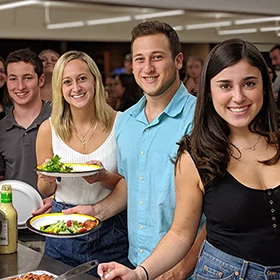Shalom from the Midwest

When sophomore Anna Luria first arrived at the University of Iowa, she was scared to walk into Iowa Hillel because she didn’t know as much about her faith as she would have liked. Hailing from the small Iowan town of Tiffin, the 19-year-old said she never had the chance to attend Hebrew school or participate in Jewish life.
“My mom is a single mom, so she could never get me to Hebrew school because it was while she was working,” says Luria, who is majoring in gender, women’s and sexuality studies. “I was always really really proud to be Jewish, but I never felt connected to my faith in the way I wanted to be.”
Now, Luria attends weekly Shabbat dinners and serves on the student board at Hillel. She says Hillel is a welcoming space, one that has connected her with other students who share her Jewish values.
Luria isn’t alone in facing the challenges of being a Midwestern Jew. While the Midwest may be known for agriculture and the friendliness of its residents, the region isn’t home to as many Jews as other parts of the country. Jews make up an estimated 1.1% in the Midwest, with 0.2% living in Iowa, according to data collected by the Berman Jewish DataBank in 2018. Jews comprise about 5.4% in the Northeast, 2.1% in the West and 1.2% in the South.
At UI, undergraduate Jewish students comprise roughly 2% of the student population, according to the Hillel College Guide. For students like Luria, this percentage is a dream come true. In contrast, for UI junior Mollie Chez, whose hometown of Skokie, Illinois has a synagogue on almost every block, the smaller Jewish student population can be daunting. Chez, 20, said she was unsure of how she’d adapt to living in Iowa as a Jewish student, but she was able to connect with others through celebrating holidays such as Passover and attending Shabbat dinners.
“Through Hillel, I have found such a wonderful, supportive community that really helps me feel connected,” says Chez, a nursing major.
University of Missouri junior Max Baker shares an experience akin to Chez’s. A St. Louis native, Baker moved from a city with many Jews to a college town where undergraduate Jewish students make up about 3% of the student body, according to the Hillel College Guide. Through Mizzou Hillel, Baker said he became closer with more Jewish students on campus through Shabbat dinners and casual conversations.
“We all have that connection of being Jewish, and it was fun and memorable having those Shabbatot, and being able to hang out with people at Hillel,” says Baker, a 20-year-old journalism major.
Of course, connecting with Jewish peers in the Midwest through weekly traditions and holidays has shifted due to the coronavirus pandemic. In mid-March, when the word “unprecedented” became common, Mizzou students were sent home. But this didn’t stop Baker from engaging with his Jewish peers on Hillel’s Twitter.
To replace the annual March Madness basketball bracket, Baker constructed a bracket of famous Jews, which gained traction on Twitter. The tweet received 1.5k likes, 825 retweets and 334 comments.
Along with the Twitter post anomaly, Mizzou Hillel has been handing out “Shabboxes,” to substitute for an in-person Shabbat dinner. The Shabboxes include challah, grape juice, candles and a small stipend for dinner with friends, Baker says.
While a number of Midwestern universities are home to a relatively small Jewish student body, some boast sizable Jewish populations. Jewish students comprise 12% of the undergraduate student population at University of Chicago and University of Wisconsin-Madison, according to the Hillel College Guide.
Samantha Galinson, a 21-year-old senior, is the president of the “We Talk Feminism” group at UW Hillel. The economics and international studies major said she misses in-person group discussions.
“Being an interactive community where you can meet more people and you could bring in friends more easily versus joining a web link is kind of nice,” Galinson says.
At University of Nebraska-Lincoln, Jews make up just 1% of the student body, according to the Hillel College Guide. Julia Raffel, a special education and elementary education major, began her freshman year knowing a few Jewish students and that a Hillel existed on campus.
Now, as UNL Hillel president, she coordinates programs with her “small but mighty” cohort, such as delivering apples and honey to students for Rosh Hashanah. Raffel, a 20-year-old junior, said there are only approximately 12 active members, but she also emails Hillel updates to UNL students who are not yet comfortable disclosing their Jewish identities on campus.
Because of the group’s size, Raffel said she doesn’t want to close off Hillel to only Jewish people. Instead, she wants others to understand there are varying religions and cultures in the area.
“Hillel is an open and welcoming space where students can learn more about Judaism,” Raffel says. “If you say, only one of your parents is Jewish, students will say, ‘Okay, wonderful!’ If you say your grandma’s husband was Jewish, students will say, ‘Okay, great!’ You can get a taste of Jewish life no matter your background.”
Madison Lotenschtein is part of the inaugural Hillel International Writers Program, a five-month opportunity for Jewish undergraduate students interested in journalism.